19 july 2015
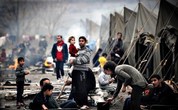
The Action Group for Palestinians in Syria said that the neighbor countries of Syria have been banning the entry of Palestinian refugees into their lands regardless of bad security conditions in the country.
The group said, in a statement on Sunday, that the Jordanian authorities bar the Palestinians of Syria from entering its land under any condition based on an official order by the Jordanian government.
Lebanese authorities as well impose certain conditions described by refugees as crippling in order for them to be able to enter Lebanon.
Those who are allowed to enter the country must possess documents that prove being invited for reunion interviews in European embassies or those who have flight reservation through Beirut Airport.
As for Turkey, the Turkish embassy in Beirut has stopped the issuance of entry of visas for Palestinian refugees from Syria to its lands two years ago. Turkish embassies in the gulf countries, however, still issue entry visas for Palestinians of Syria, but only for those who have residencies in those countries.
Human rights activists opine that such procedures put the lives of Palestinian refugees in Syria at a real risk, which runs contrary to international laws and regulations on the protection of refugees during wars and crises.
The group said, in a statement on Sunday, that the Jordanian authorities bar the Palestinians of Syria from entering its land under any condition based on an official order by the Jordanian government.
Lebanese authorities as well impose certain conditions described by refugees as crippling in order for them to be able to enter Lebanon.
Those who are allowed to enter the country must possess documents that prove being invited for reunion interviews in European embassies or those who have flight reservation through Beirut Airport.
As for Turkey, the Turkish embassy in Beirut has stopped the issuance of entry of visas for Palestinian refugees from Syria to its lands two years ago. Turkish embassies in the gulf countries, however, still issue entry visas for Palestinians of Syria, but only for those who have residencies in those countries.
Human rights activists opine that such procedures put the lives of Palestinian refugees in Syria at a real risk, which runs contrary to international laws and regulations on the protection of refugees during wars and crises.
17 july 2015
|
|
Germany's chancellor faced a strong backlash when her televised comments on immigration triggered an emotional response with one of the shows young participants.
German Chancellor Angela Merkel found herself in a tough situation Thursday when she was confronted by a young Palestinian refugee named Reem who burst into tears on a German TV show. The show titled “Good life in Germany” attempted to tackle the thorny issue of refugees and immigration in Germany. Reem told Merkel how she and her family had arrived in Germany from a Palestinian refugee camp in Lebanon four years earlier, and of how she dreamed of being able to study and enjoy life. |
Merkel responded to Reem's emotional plea by saying that, “politics is sometimes hard. You’re right in front of me now and you’re an extremely sympathetic person. But you also know in the Palestinian refugee camps in Lebanon are thousands and thousands and if we were to say you can all come - we just can’t manage it.”
The young girl immediately began sobbing and a slightly shaken Merkel responded by walking over to Reem and rubbing her shoulder in an attempt to console her. “You were great - I know it’s difficult for you and you presented extremely well the situation that many others find themselves in," she said.
When challenged by the show's host, Merkel responded saying, "I know it's a difficult situation, but I still want to give her a pat."
But Merkel's blunt words about swiftly deporting those whose asylum applications are denied drew harsh criticism.
"The mistakes in the government's refugee policies can't be patted away," tweeted Katrin Goering-Eckardt of the opposition Green party.
Others said Merkel had reacted compassionately and it was her job to explain government policy on asylum.
Germany has seen a sharp rise in refugee numbers in recent years. Figures released this week showed that 179,037 asylum applications were filed in the first six months of 2015, more than twice as many as the same period last year.
Merkel's office said the chancellor didn't speak to the girl, after the event.
The young girl immediately began sobbing and a slightly shaken Merkel responded by walking over to Reem and rubbing her shoulder in an attempt to console her. “You were great - I know it’s difficult for you and you presented extremely well the situation that many others find themselves in," she said.
When challenged by the show's host, Merkel responded saying, "I know it's a difficult situation, but I still want to give her a pat."
But Merkel's blunt words about swiftly deporting those whose asylum applications are denied drew harsh criticism.
"The mistakes in the government's refugee policies can't be patted away," tweeted Katrin Goering-Eckardt of the opposition Green party.
Others said Merkel had reacted compassionately and it was her job to explain government policy on asylum.
Germany has seen a sharp rise in refugee numbers in recent years. Figures released this week showed that 179,037 asylum applications were filed in the first six months of 2015, more than twice as many as the same period last year.
Merkel's office said the chancellor didn't speak to the girl, after the event.

Spokesperson for the UN agency for Palestine Refugees (UNRWA) Sami Mushasha, Thursday affirmed in a press release that UNRWA and PLO’s Department of Refugee Affairs continue to work hand in hand with officials in Palestine to provide the best service to the Palestinian refugees.
Mushasha said in a press release which WAFA received that “Palestine is an active member in UNRWA’s advisory commission, where UNRWA Commissioner-General Pierre Krähenbühl accepts the efforts and guidance from Palestinian officials when it comes to finding solutions to the severe fiscal deficit UNRWA is experiencing recently.
The latest comments came in light an article published on a local media outlet which claimed that UNRWA accuses the PLO of neglecting the crisis befalling Palestinian refugees in Lebanon and dealing with their suffering in a negative manner.
UNRWA’s spokesperson in Jerusalem Mushasha further affirmed that this close relationship with the PLO will continue and further flourish to safeguard the interests of Palestinian refugees everywhere.
Mushasha said in a press release which WAFA received that “Palestine is an active member in UNRWA’s advisory commission, where UNRWA Commissioner-General Pierre Krähenbühl accepts the efforts and guidance from Palestinian officials when it comes to finding solutions to the severe fiscal deficit UNRWA is experiencing recently.
The latest comments came in light an article published on a local media outlet which claimed that UNRWA accuses the PLO of neglecting the crisis befalling Palestinian refugees in Lebanon and dealing with their suffering in a negative manner.
UNRWA’s spokesperson in Jerusalem Mushasha further affirmed that this close relationship with the PLO will continue and further flourish to safeguard the interests of Palestinian refugees everywhere.
16 july 2015
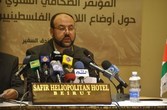
Hamas’ representative in Lebanon Ali Baraka stressed Tuesday that Palestinian national and Islamic movements are keen on preserving civil peace in Lebanon and on strengthening Palestinian-Lebanese relations.
"Palestinians have no ambitions in Lebanon; they are as refugees seeking the right of return to Palestine," he stressed.
During a ceremony held by Hamas in Beirut, Baraka pointed to his group’s ongoing efforts to prevent any sectarian strife inside or outside the Palestinian refugee camps in Lebanon.
On the other hand, he warned of the serious implications of UNRWA’s recent decisions to reduce its services provided to Palestinian refugees.
The senior leader in Hamas movement stressed the urgent need to adopt a Palestinian-Arab strategy to deal with UNRWA’s planned measures, calling on the Lebanese government to allow Palestinian protests on the border areas with Palestinian occupied territories in rejection to UNRWA’s decisions.
In another context, he hailed the Palestinian resistance achievements during Israel’s summer aggression on Gaza that coincides these days.
"Resistance is the sole path to achieve Palestinian liberation and independence," he added.
Baraka called on the international community and Arab League to work on lifting the siege on Gaza, to accelerate Gaza reconstruction, and to hold Israeli leaders accountable for committing war crimes.
"Palestinians have no ambitions in Lebanon; they are as refugees seeking the right of return to Palestine," he stressed.
During a ceremony held by Hamas in Beirut, Baraka pointed to his group’s ongoing efforts to prevent any sectarian strife inside or outside the Palestinian refugee camps in Lebanon.
On the other hand, he warned of the serious implications of UNRWA’s recent decisions to reduce its services provided to Palestinian refugees.
The senior leader in Hamas movement stressed the urgent need to adopt a Palestinian-Arab strategy to deal with UNRWA’s planned measures, calling on the Lebanese government to allow Palestinian protests on the border areas with Palestinian occupied territories in rejection to UNRWA’s decisions.
In another context, he hailed the Palestinian resistance achievements during Israel’s summer aggression on Gaza that coincides these days.
"Resistance is the sole path to achieve Palestinian liberation and independence," he added.
Baraka called on the international community and Arab League to work on lifting the siege on Gaza, to accelerate Gaza reconstruction, and to hold Israeli leaders accountable for committing war crimes.
15 july 2015
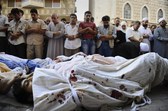
The Action Group for Palestinians in Syria (AGPS) declared that 55 Palestinian refugees died outside Syria after being forced to leave their refugee camps due to the ongoing conflict there.
The reported deaths were documented in Egypt, Malta, Greece, Lebanon, Turkey, Palestine, Italy, Libya, Sweden, Cyprus, and Macedonia.
At least 2,910 Palestinian refugees were killed in Syria since the outbreak of the ongoing events there, the group earlier said.
The reported deaths were victims of starvation, torture, bombing, and drowning at sea while on their way to Europe fleeing the horrors of the conflict in Syria, the group clarified.
Along the same line, the AGPS stated that the Syrian security forces continue to arrest a group of Palestinian medics and doctors in charge of helping injuries, saying that a number of them were tortured to death.
The Action Group said that there are currently 992 Palestinian refugees in Syrian regime prisons, while 406 died in custody after being subjected to severe torture.
On the other hand, heavy shelling targeted the adjacent areas of Khan Al-Shieh camp on Tuesday night, in coincidence with clashes erupted between the opposition and regime forces.
A state of panic was prevailed among the residents of the camp who already suffer very serious humanitarian conditions due to the continued daily clashes.
The reported deaths were documented in Egypt, Malta, Greece, Lebanon, Turkey, Palestine, Italy, Libya, Sweden, Cyprus, and Macedonia.
At least 2,910 Palestinian refugees were killed in Syria since the outbreak of the ongoing events there, the group earlier said.
The reported deaths were victims of starvation, torture, bombing, and drowning at sea while on their way to Europe fleeing the horrors of the conflict in Syria, the group clarified.
Along the same line, the AGPS stated that the Syrian security forces continue to arrest a group of Palestinian medics and doctors in charge of helping injuries, saying that a number of them were tortured to death.
The Action Group said that there are currently 992 Palestinian refugees in Syrian regime prisons, while 406 died in custody after being subjected to severe torture.
On the other hand, heavy shelling targeted the adjacent areas of Khan Al-Shieh camp on Tuesday night, in coincidence with clashes erupted between the opposition and regime forces.
A state of panic was prevailed among the residents of the camp who already suffer very serious humanitarian conditions due to the continued daily clashes.
14 july 2015
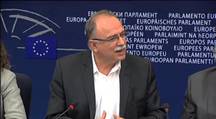
Vice-President of the European Parliament, MEP Dimitrios Papadimoulis, has joined more than 115 of the European MEPs and British MPs in supporting the Palestinian Return Centre’s bid to the United Nation’s ECOSOC NGO Consultative status.
Mr. Papadimoulis has called on the ECOSOC member states to approve the recommendations of the NGO Committee regarding the centre.
Papadimoulis stressed the need for all member states to vote in favor of the bid during the forthcoming meeting set to be held in New York next week.
Earlier, over 100 European MPs called on the United Nations' Economic and Social Council (ECOSOC) to officially endorse appeals to grant recognized NGO status to the Palestinian Return Center.
In early June 2015, United Nations NGO committee has recommended that the Palestinian Return Center be granted the United Nations Economic and Social Council Consultative Status. The NGO won the vote with a landslide majority as 12 states voted Yes, 3 voted No, and 3 abstained.
The Palestinian Return Center is a UK-based pro-Palestine NGO working in favor of Palestinian refugees and diaspora in accordance with the international law.
Mr. Papadimoulis has called on the ECOSOC member states to approve the recommendations of the NGO Committee regarding the centre.
Papadimoulis stressed the need for all member states to vote in favor of the bid during the forthcoming meeting set to be held in New York next week.
Earlier, over 100 European MPs called on the United Nations' Economic and Social Council (ECOSOC) to officially endorse appeals to grant recognized NGO status to the Palestinian Return Center.
In early June 2015, United Nations NGO committee has recommended that the Palestinian Return Center be granted the United Nations Economic and Social Council Consultative Status. The NGO won the vote with a landslide majority as 12 states voted Yes, 3 voted No, and 3 abstained.
The Palestinian Return Center is a UK-based pro-Palestine NGO working in favor of Palestinian refugees and diaspora in accordance with the international law.
13 july 2015
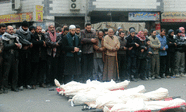
At least 2,910 Palestinian refugees were killed in Syria since the outbreak of the ongoing events there, the Action Group for Palestinians in Syria (AGPS) reported Sunday.
The reported deaths were victims of starvation, torture, bombing, and drowning at sea while on their way to Europe fleeing the horrors of the conflict in Syria, the group clarified.
1,860 victims were confirmed to have been killed in the Palestinian refugee camps throughout Syria, while the rest were reported outside the country.
78 Palestinians were tortured to death during March in the Syrian regime prisons, the AGPS added.
46 others were killed after the ISIS’s attack on Yarmouk refugee camp.
The reported deaths were victims of starvation, torture, bombing, and drowning at sea while on their way to Europe fleeing the horrors of the conflict in Syria, the group clarified.
1,860 victims were confirmed to have been killed in the Palestinian refugee camps throughout Syria, while the rest were reported outside the country.
78 Palestinians were tortured to death during March in the Syrian regime prisons, the AGPS added.
46 others were killed after the ISIS’s attack on Yarmouk refugee camp.
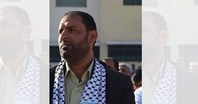
ISIS militants on Sunday evening assassinated senior Hamas official Mustafa Sharaan as he was leaving a mosque in the embattled refugee camp of al-Yarmouk, south of Damascus.
According to media sources, Sharaan suffered a serious bullet injury in the head when ISIS masked gunmen opened fire at him outside the mosque.
Sharaan was an active relief worker who had dedicated his time to help the impoverished refugees in al-Yarmouk camp since their humanitarian suffering started three years ago.
According to media sources, Sharaan suffered a serious bullet injury in the head when ISIS masked gunmen opened fire at him outside the mosque.
Sharaan was an active relief worker who had dedicated his time to help the impoverished refugees in al-Yarmouk camp since their humanitarian suffering started three years ago.
9 july 2015
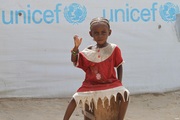
The United Nations Children's Fund (UNICEF) said on Tuesday that it has delivered aid to families displaced from Yarmouk, a Palestinian refugee camp in the Syrian capital Damascus.
According to a statement issued by UNICEF, a copy of which was made available to Anadolu agency, the organisation said that it was able to reach families in Yalda, Beit Sahem and Babbila, areas located about 10 km to the south of Damascus and which foreign aid has not been able to enter for the last two years.
The organisation confirmed that it was able to send medical supplies to over 3,000 people, including 5 midwifery kits (enough for 250 normal deliveries), along with clothing, materials and food supplements for children.
According to the UNICEF staff who were part of the aid convoys, 50 000 people live in these areas, in addition to about 2,500 Palestinian refugee families who fled the Yarmouk camp.
UNICEF spokesman Juliette Touma said they were not previously able to access these areas because they could not get permission from the Syrian government.
UNICEF noted that the aid supplies passed by 5 checkpoints before it reached those areas.
Syrian regime forces have been surrounding the Yarmouk refugee camp for nearly three years. The camp is currently inhabited by an estimated 18,000 Palestinians.
Half a million Palestinians lived in Yarmouk before the outbreak of the Syrian conflict in 2011. But since the camp has been put under siege and subjected to "daily bombardment" in the past two years, at least 185,000 of the camp's inhabitants fled to other areas inside Syria or to neighboring countries, according to the Syrian Human Rights Network.
According to a statement issued by UNICEF, a copy of which was made available to Anadolu agency, the organisation said that it was able to reach families in Yalda, Beit Sahem and Babbila, areas located about 10 km to the south of Damascus and which foreign aid has not been able to enter for the last two years.
The organisation confirmed that it was able to send medical supplies to over 3,000 people, including 5 midwifery kits (enough for 250 normal deliveries), along with clothing, materials and food supplements for children.
According to the UNICEF staff who were part of the aid convoys, 50 000 people live in these areas, in addition to about 2,500 Palestinian refugee families who fled the Yarmouk camp.
UNICEF spokesman Juliette Touma said they were not previously able to access these areas because they could not get permission from the Syrian government.
UNICEF noted that the aid supplies passed by 5 checkpoints before it reached those areas.
Syrian regime forces have been surrounding the Yarmouk refugee camp for nearly three years. The camp is currently inhabited by an estimated 18,000 Palestinians.
Half a million Palestinians lived in Yarmouk before the outbreak of the Syrian conflict in 2011. But since the camp has been put under siege and subjected to "daily bombardment" in the past two years, at least 185,000 of the camp's inhabitants fled to other areas inside Syria or to neighboring countries, according to the Syrian Human Rights Network.
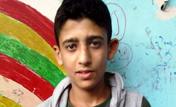
In the weeks leading up to Syria’s ninth-grade national exams, 16-year-old Maher suffered from nightmares. Unusually for a student, he was less concerned about the exams and more worried about reaching the examination centre. “Every night I had a nightmare,” he recalled. “We were at the checkpoint to get out of Yarmouk and a mortar shell landed. We could not get to the exam.”
Living in Yarmouk, which has become a byword for civilian suffering in the brutal conflict in Syria, Maher and many other youth in the area have been undeterred from continuing their education. Up to 18,000 civilians remain in the area, which has been under siege for almost two years. Residents suffer from severe shortages of food, water, medication and electricity. Many rely solely on humanitarian assistance from UNRWA, which arrives sporadically depending on access to the area.
“My father used to wait for several hours to get an UNRWA food parcel, while my mother would go out foraging in former gardens for herbs to flavour our meals,” said Maher. “I would also collect wood from the roads so my mother could cook for us.” In 2014, UNRWA was only given access to distribute aid to Yarmouk on 131 out of 365 days. This averaged only 400 kcal per resident per day, falling well short of the UN recommended intake of 2,100 kcal per day.
In early April, the situation in Yarmouk changed for the worse when armed violence escalated again, placing the lives of civilians at even greater risk. Maher fears for his family and their future. “The situation in the camp is terrifying for us,” he said. “We cannot take the risk of leaving our house more than once or twice per week to collect food and supplies to survive.” He adds, “It is dangerous each time we go out, and we all worry about each other during their absence.”
Despite these harrowing circumstances, education remains a top priority for the Palestine refugee community in Yarmouk. Teachers and community volunteers established their own school to make up for missed lessons. Without electricity at night, students had to fit their studies into daylight hours. “I want to express my gratitude to the teachers who followed my studies during the year and gave me private lessons,” Maher said.
In May 2015, an agreement was reached to let Maher and 129 other Palestine refugee students exit the besieged neighbourhood of Yarmouk in Damascus. With the support of UNRWA, they had two weeks to complete their ninth-grade national exams. While boarding at the UNRWA Palestine Institute School, the students received three hot meals per day, attended catch-up classes, and had the chance to meet 134 other Palestine refugee students who returned to Syria from Lebanon to complete the Syrian curriculum exams. “It was the first time I had left my family for so long,” Maher noted. “I missed them, and I missed my home.”
Upon completing his exams, Maher was unwavering about returning to Yarmouk. He missed his family, and he believes that the neighbourhood will be rebuilt. With such determination to see a bright future, young people like Maher will play a critical role in the future of Syria. “I hope to get back to the old Yarmouk, where we were secure as one Palestine people and one family,” he said. “Yarmouk represents my past and my future.”
Living in Yarmouk, which has become a byword for civilian suffering in the brutal conflict in Syria, Maher and many other youth in the area have been undeterred from continuing their education. Up to 18,000 civilians remain in the area, which has been under siege for almost two years. Residents suffer from severe shortages of food, water, medication and electricity. Many rely solely on humanitarian assistance from UNRWA, which arrives sporadically depending on access to the area.
“My father used to wait for several hours to get an UNRWA food parcel, while my mother would go out foraging in former gardens for herbs to flavour our meals,” said Maher. “I would also collect wood from the roads so my mother could cook for us.” In 2014, UNRWA was only given access to distribute aid to Yarmouk on 131 out of 365 days. This averaged only 400 kcal per resident per day, falling well short of the UN recommended intake of 2,100 kcal per day.
In early April, the situation in Yarmouk changed for the worse when armed violence escalated again, placing the lives of civilians at even greater risk. Maher fears for his family and their future. “The situation in the camp is terrifying for us,” he said. “We cannot take the risk of leaving our house more than once or twice per week to collect food and supplies to survive.” He adds, “It is dangerous each time we go out, and we all worry about each other during their absence.”
Despite these harrowing circumstances, education remains a top priority for the Palestine refugee community in Yarmouk. Teachers and community volunteers established their own school to make up for missed lessons. Without electricity at night, students had to fit their studies into daylight hours. “I want to express my gratitude to the teachers who followed my studies during the year and gave me private lessons,” Maher said.
In May 2015, an agreement was reached to let Maher and 129 other Palestine refugee students exit the besieged neighbourhood of Yarmouk in Damascus. With the support of UNRWA, they had two weeks to complete their ninth-grade national exams. While boarding at the UNRWA Palestine Institute School, the students received three hot meals per day, attended catch-up classes, and had the chance to meet 134 other Palestine refugee students who returned to Syria from Lebanon to complete the Syrian curriculum exams. “It was the first time I had left my family for so long,” Maher noted. “I missed them, and I missed my home.”
Upon completing his exams, Maher was unwavering about returning to Yarmouk. He missed his family, and he believes that the neighbourhood will be rebuilt. With such determination to see a bright future, young people like Maher will play a critical role in the future of Syria. “I hope to get back to the old Yarmouk, where we were secure as one Palestine people and one family,” he said. “Yarmouk represents my past and my future.”
6 july 2015

A public seminar in the House of Lords is expected to be held by the Palestine Return Centre ( PRC) on “The Economic and Social Challenges facing Palestinian Refugees and the Search for Solutions”.
Speakers at the seminar include Prof. Manuel Hassassian, Palestine's ambassador to the UK, Clare Short, politician and former Member of Parliament, and Sahdya Darr, a researcher at PRC, among others.
The seminar came in light of the increasing suffering of Palestinian refugees especially after the Syrian revolution, as thousands of refugees were forced to leave their refugee camps in Syria fleeing from the ongoing bloody events there.
UNRWA has earlier declared intention to reduce its services for Palestinian refugees. The decision will seriously worsen the Palestinian refugees' deteriorating living conditions and especially those who were displaced in Syria.
Speakers at the seminar include Prof. Manuel Hassassian, Palestine's ambassador to the UK, Clare Short, politician and former Member of Parliament, and Sahdya Darr, a researcher at PRC, among others.
The seminar came in light of the increasing suffering of Palestinian refugees especially after the Syrian revolution, as thousands of refugees were forced to leave their refugee camps in Syria fleeing from the ongoing bloody events there.
UNRWA has earlier declared intention to reduce its services for Palestinian refugees. The decision will seriously worsen the Palestinian refugees' deteriorating living conditions and especially those who were displaced in Syria.
4 july 2015
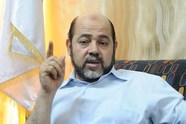
Member of Hamas's political bureau Mousa Abu Marzouk has held many meetings with leaders of Palestinian factions for three consecutive days to discuss the Palestinian affairs in occupied Palestine and in diaspora.
The meetings were attended by many notables and leaders from Fatah Movement, Palestine Liberation Organization (PLO), the Popular Committee, the Democratic Front for the Liberation of Palestine (DFLP), Islamic Jihad Movement in Lebanon, and a delegation from the Popular Struggle Front.
The Palestinian reconciliation was tackled during the meetings, especially convening the provisional leadership of PLO, forming a national unity government, lifting the siege imposed on Gaza, reconstructing Gaza, the conflict with Israel, and the political initiatives.
The meetings, also attended by Hamas's political bureau member Mohammad Nasr, Head of Hamas's Foreign Relations Osama Hamdan, and Hamas's representative in Lebanon Ali Baraka, discussed the UNRWA plans to shrink its services to the refugees, and the political, economic, social and security situation in the Palestinian camps in Lebanon, in addition to ways to promote the Lebanese-Palestinian relations.
The leaders stressed the importance of unifying national efforts, adhering to the Palestinian people's rights and constants, and drawing up a unified national strategy for the Palestinian factions in the struggle against Israel.
The meetings were attended by many notables and leaders from Fatah Movement, Palestine Liberation Organization (PLO), the Popular Committee, the Democratic Front for the Liberation of Palestine (DFLP), Islamic Jihad Movement in Lebanon, and a delegation from the Popular Struggle Front.
The Palestinian reconciliation was tackled during the meetings, especially convening the provisional leadership of PLO, forming a national unity government, lifting the siege imposed on Gaza, reconstructing Gaza, the conflict with Israel, and the political initiatives.
The meetings, also attended by Hamas's political bureau member Mohammad Nasr, Head of Hamas's Foreign Relations Osama Hamdan, and Hamas's representative in Lebanon Ali Baraka, discussed the UNRWA plans to shrink its services to the refugees, and the political, economic, social and security situation in the Palestinian camps in Lebanon, in addition to ways to promote the Lebanese-Palestinian relations.
The leaders stressed the importance of unifying national efforts, adhering to the Palestinian people's rights and constants, and drawing up a unified national strategy for the Palestinian factions in the struggle against Israel.
2 july 2015
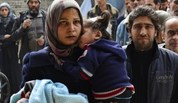
At least 14 Palestinian refugee families who had fled war-tattered Syria have been detained by the Slovakian authorities, the Action Group for Palestinians in Syria reported.
A letter sent to the Action Group by 14 Palestinian refugee families detained in Slovakia appealed to the International Red Cross, among other human rights organizations, to work on their release.
The detained refugee families had been taking cover in such ragged Syrian camps as the Yarmouk and the Neirab.
The refugee families launched a cry for help over the state of panic and trauma overwhelming their children due to the unbearable experience they have been through and the lack of safety quite normally needed at their age.
They said the authorities taking charge of the camp in which they have been locked up vowed to release them in a month’s time and to hand them to the Hungarian authorities in case the latter agreed to host them.
The 14 Palestinian refugee families have fled Syria trying to reach Greece on board the so-called “death boats” before they were detained by the Slovakian authorities.
A letter sent to the Action Group by 14 Palestinian refugee families detained in Slovakia appealed to the International Red Cross, among other human rights organizations, to work on their release.
The detained refugee families had been taking cover in such ragged Syrian camps as the Yarmouk and the Neirab.
The refugee families launched a cry for help over the state of panic and trauma overwhelming their children due to the unbearable experience they have been through and the lack of safety quite normally needed at their age.
They said the authorities taking charge of the camp in which they have been locked up vowed to release them in a month’s time and to hand them to the Hungarian authorities in case the latter agreed to host them.
The 14 Palestinian refugee families have fled Syria trying to reach Greece on board the so-called “death boats” before they were detained by the Slovakian authorities.
1 july 2015

UNRWA said that it may have to close 700 schools across its areas of operation due to the lack of funding.
Spokesman for the UNRWA in Gaza Adnan Abu Hassna told Anatolia news agency that 700 schools, that offer places to half a million children, will be closed by the beginning of the next school year due to the financial crisis faced by the Agency.
"There is no official decision in this regard, but due to the Agency's serious financial deficit that stands at US$ 101 million we will be forced not to open our schools by the beginning of the next school year," he said.
252 UNRWA schools in Gaza Strip that offer services to 248,000 students are threatened with closure in case the financial deficit was not solved.
UNRWA deficit will deprive 5 million refugees across Gaza, West Bank, Lebanon, Jordan, and Syria from its services.
Spokesman for the UNRWA in Gaza Adnan Abu Hassna told Anatolia news agency that 700 schools, that offer places to half a million children, will be closed by the beginning of the next school year due to the financial crisis faced by the Agency.
"There is no official decision in this regard, but due to the Agency's serious financial deficit that stands at US$ 101 million we will be forced not to open our schools by the beginning of the next school year," he said.
252 UNRWA schools in Gaza Strip that offer services to 248,000 students are threatened with closure in case the financial deficit was not solved.
UNRWA deficit will deprive 5 million refugees across Gaza, West Bank, Lebanon, Jordan, and Syria from its services.
